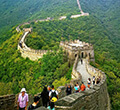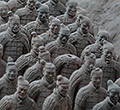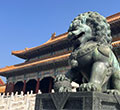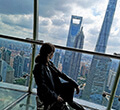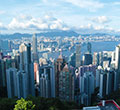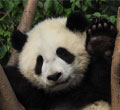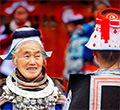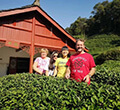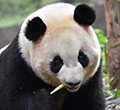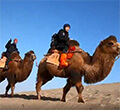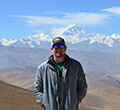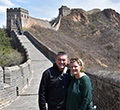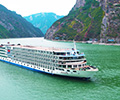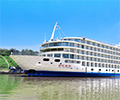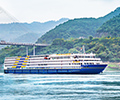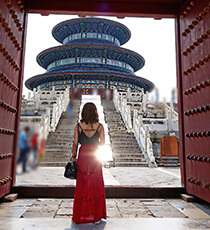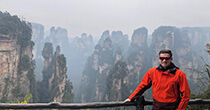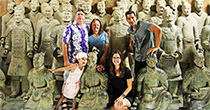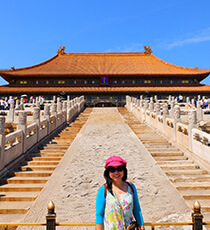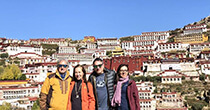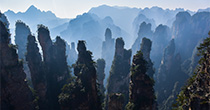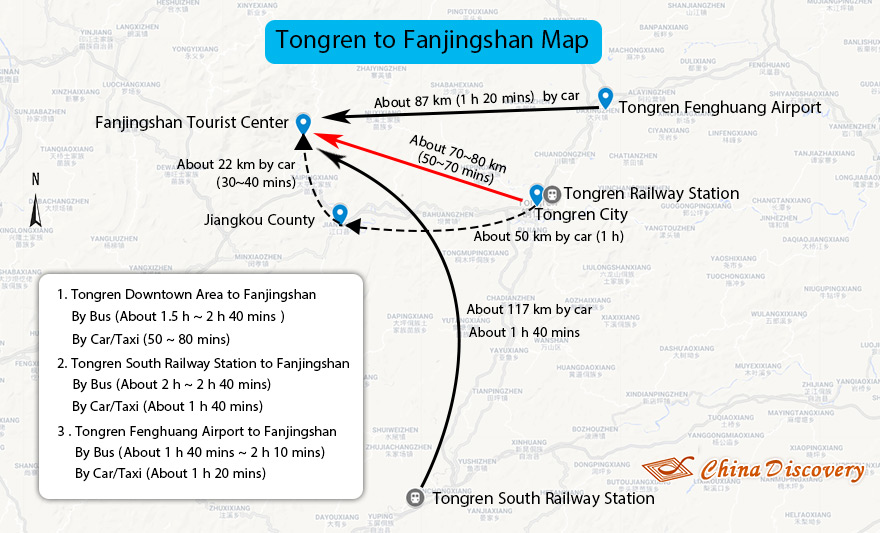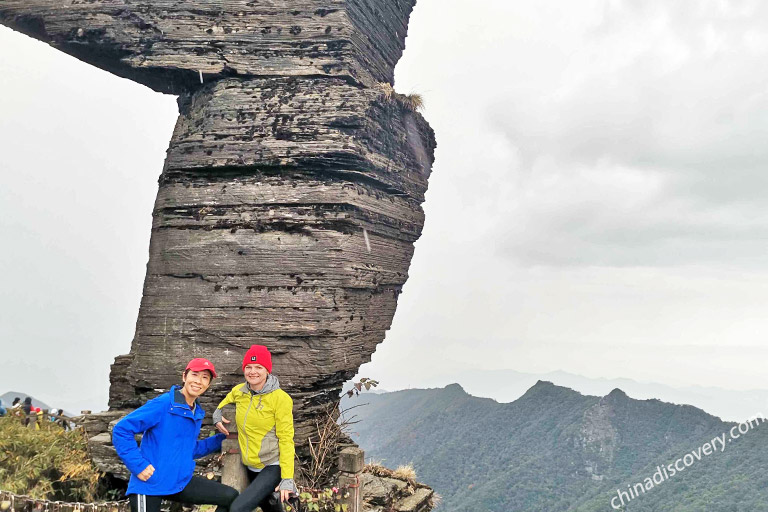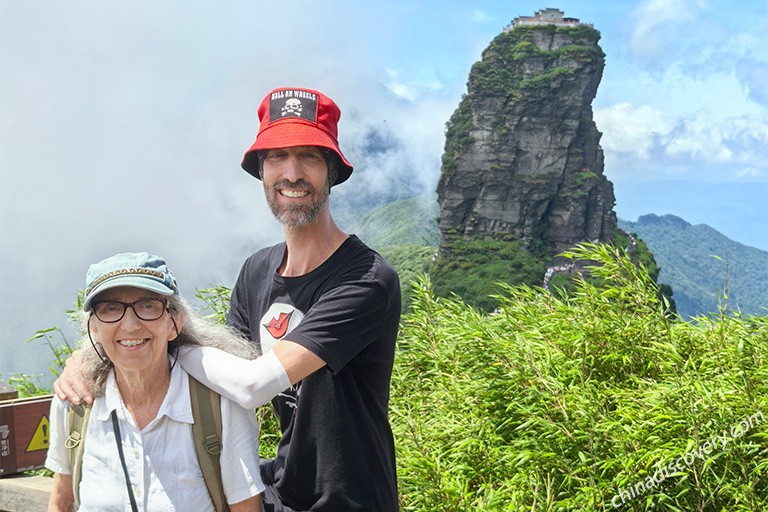Why has Fanjingshan been Listed in UNESCO World Heritage Site
You may wonder why Fanjingshan has been listed in the world heritage site in 2018, as a nameless mountain for millenniums suddenly popped out from nowhere. The following storming compliments from National Geographic and other major travelling websites entitle Fanjingshan as "the top 3 best trip in 2019".
The mountain was named "Fanjing", an abbreviation of Fantianjingtu, a Buddhist term which means "Brahma's Pure Land". Whether Fanjingshan was Buddha's dwelling place or not, it is a real pure land to 4,395 species of plants and 2,767 of animals, including many of the endangered.
UNESCO recognizes Fanjingshan as a site considered to have "outstanding universal value". Since 1978, the Fanjingshan national nature reserve has been established and ran for years, sheltering those wonderful creatures there.
▶ 3 Days Classic Fanjingshan Tour
Natural Habitat for Various Species
The isolated Wuling Mountain Range is known as "the gene database of China" due to its rich biodiversity. The region has 2,000 types of plant, 31 of which are endangered, and 19 threatened animal species roam these forests.
Among the Wuling mountains, Fanjingshan is a rugged terrain of primary forest, with a National Nature Reserve covering a total area of 567 square kilometers (219 sq mi), which is a conservation area for primitive vegetation of the mid sub-tropic alpine region of western China.
A great number of endangered and endemic flora and fauna species inhabit there, such as the elusive golden monkey, the Fanjingshan fir, the Chinese giant salamander, forest musk deer, and Reeve's pheasant. Due to the high humidity at Fanjingshan, it also shows an extraordinary richness in mosses.
One of those endangered animals is the endemic grey snub-nosed monkey. Scientists know very little about them with no more than 750 surviving till today - much rare than pandas.
The hope is that the UNESCO World Heritage status will help to preserve these species.
Sacred Mountain of Buddhism
Fanjingshan or Mount Fanjing has been a sacred and tranquil site for Buddhists since the Tang Dynasty (618AD-907AD), ranking just behind the Four Sacred Mountains of Buddhism.
It is believed by a number of Buddhism believers that Fanjingshan is a spot in which one can reach their spiritual enlightenment as Maitreya Buddha did.
During the Ming Dynasty (1368AD-1644AD), 48 Buddhist temples were built on the mountain, many of which have since been destroyed. For those still remained, they are significant sites for Buddhist worshippers around the world.
The influence of Buddhism reached Fanjingshan by the Tang dynasty (618AD-907AD). The local chronicles record the construction of some temples in the area and more temples were built in the Song and Yuan dynasties (960AD-1368AD).
Since Buddhism greatly prospered during the Ming and Qing dynasties in China (1368AD-1912AD), many other temples were constructed in the golden summit area of Fanjingshan.
After decades of Buddhism Renaissance after the damages, Fanjingshan Buddhist Cultural Park was opened in 2010. A Golden Hall that houses a five-meter-tall statue of the Maitreya Buddha was made of gold weighting 250 kilograms and thousands of gems. It is the largest gold Maitreya statue in the world.

Temples on Fanjingshan Summit

Fanjingshan Summit at Night

Dove Tree at Fanjingshan

Forest Musk Deer at Fanjingshan

Reeve's Pheasant & Golden Monkey
What to See at Fanjingshan/Mount Fanjing
Red Clouds Golden Summit (Pinyin: Hongyun Jinding 红云金顶)
The Thumb-like peak is described by UNESCO as an "island of metamorphic rock in a sea of karst", believed to have been formed somewhere between 2 million and 65 million years ago. For everyone else, one of the main appeals of visiting Fanjingshan is the stunning views from the summit. Or rather, summits - there are three up there. The Red Clouds Golden Summit is the representative one, about 2336 meters above sea level. The whole crest is upright like a thumb, as if the hill's encouragement for all the ambitious hikers. There is a steep vertical ascent of 100 meters to the top with a marvelous bridge connecting two Buddhist temples on each peak, which is known as the Fanjingshan Temple. During sunset/sunrise, the whole summit is enveloped with overhead red-tinted clouds, and Red Cloud, Hongyun in Chinese also means Good Luck (Pinyin:Hongyundangtou 鸿运当头), and the summit was named after it.
Mushroom Stone (Pinyin: Mogushi 蘑菇石)
The whole stone pillar is big on the top and small at the bottom, vividly formed like a mushroom. It is about ten meters high and elegant, seemingly inclined to fall in gale. However, for more than one billion years, it has been standing there still and hit by the rainstorms, summer heat and winter snow year after year, which is the essence of what Buddhism says about "Remain unbiased" in every circumstance.
Many painters and photographers have created countless masterpieces with its image. Now the mushroom stone is the landmark of Fanjingshan, and has begun to be known by the world.

Our Guest Josh Visited Red Clouds Golden Summit

Josh and His Mother Visited Mushroom Stone in July
Old Golden Summit (Pinyin: Laojinding 老金顶)
At an elevation of 2,494 metres, the Old Golden Summit is located near the mushroom stone, which is the highest scenic site of Fanjingshan. On the top of Old Golden Summit is a temple dedicated to Buddha Dipamkara. For the special rock texture, the ancients could see their own reflection under the moonlight, which could be used as a mirror, so it is also called "Moon Mirror Mountain".
Cheng En Temple (Pinyin: Chengensi 承恩寺)
Cheng En Temple is located between the two summits with scarlet walls and black tiles. It is the main building of Fanjingshan Temple Group and one of the four Royal temples in Fanjingshan. Cheng En Temple was built in the Ming Dynasty (1368AD-1644AD), then destroyed in the war. After the restoration and reconstruction generation after generation at the same ancient site, the temple group has been brought back from the ancient memory again.
Wanbao Rock (Pinyin: Wanbaoyan 万宝岩)
Wanbao Rock is the geological epic of Fanjingshan Mountain, showing the evolution of its vicissitudes: 1.4 billion years ago, it used to be part of the ocean. Because of the continuous crustal movement, Fanjingshan was gradually created and stretches over 700 miles. Wanbao Rock is the original rock raised from the sea bed at that time. It is cemented by various pebbles, a large number of rare metals and fossils, and shells. The rock shines under the sun as if there are gems inlaid. Wanbao means thousands of treasures in Chinese and they are actually treasures from the sea.
Book-Shaped Rocks (Pinyin: Wanjuanshu 万卷书)
Book-shaped Rocks are sitting near the mushroom stone. These rocks are seemingly piles of books spreading out of order, when looked from a distance. There are also natural gaps between each stack of books. According to a Chinese legend, the ancient monk, Xuanzang returned from the Buddhist center in the west and brought back some treasured scriptures. As he passed by at Fanjingshan, a stack of Buddhist scriptures scattered from his luggage, and these magic scriptures became piles of book-shaped rocks right after they hit the ground.
Fleecy Ridge (Pinyin: Mianxuling 棉絮岭)
With fluffy clouds covered nearly all year round, the ridge is named after it. Here you can witness one of the great wonders at Fanjing Mountain - a sleeping Buddha stretching far for thousands of meters. Standing at Fleecy Ridge and looking out, the peaks and valleys forms the outline figure of a reclining Buddha. For thousands of years, the local people worshipped it as a great Buddha as they saw it.
Meteorological Wonders
There are two unique meteorological wonders at Fanjingshan: the Sea of Clouds and the Light of Buddha. The former one, that is, when the mountains are bathing in the mist with clouds floating around, which forms the sea of clouds. According to statistics, the average number of days when cloud sea appearing in Fanjingshan reaches over 180 days, and more frequently the cloud sea happens in summer and comparatively rarer in autumn and winter. And Buddha light also belongs to a natural phenomenon called "Brocken Spectre". If it happens, you may also see a rainbow ring in the distance between the mountains. It is related to the refraction of light, which in the past was interpreted as the presence of Buddha, a blissful omen for Buddhists.
(Please note: Red Clouds Golden Summit and Old Golden Summit may be closed during bad weather days of heavy snow, icy road, rainstorm, etc. Please keep up with the weather forest of Fanjingshan to plan your trip there!)
Most Popular Tour to Visit Fanjingshan:
▶ 7 Days Zhangjiajie to Fanjingshan Unbelievable Nature Tour

Josh and His Mother Visited Cheng En Temple

Book-Shaped Rocks

The Figure of the Sleeping Buddha

Fanjingshan Cloud Sea

Buddha's Light
Fanjingshan Seasonal Scenery
It is neither too hot in summer in nor no cold in winter, no gale blowing, or no sand storming. The average annual temperature is 13.1-14.7 degrees Celsius. Among them, the hottest days occur in the late July, and the average temperature is 25.3 degrees Celsius; the coldest nights approach in February, and the average temperature is 2 degrees Celsius. Rainfall season is intense from May to October. If tourists travel at this time, the weather of Fanjingshan is changeable, raincoats, umbrellas are necessary travelling items. Fanjingshan has its attractive sights all year round. Every season brings different beauty to the tourists.
▶ Learn More about: Fanjingshan Weather & Seasons
Spring (March-May)
ISpring can be the best season to visit Fanjingshan. It is in light green with colorful wild flowers lying around, and next to the Dong minority villages at the bottom of mount Fanjing is a golden field of rapeseed flowers. While the temperature at the top is about 10 degrees lower than the bottom of Fanjingshan. If you go atop during this time, it is recommended to bring a thick windproof coat with you. Flaming rhododendron blooms all over the mountains in April. Breathing the fresh air, roaming around in the blazing rhododendron field, you will be content for what the beauty of nature brings you.
Summer (June-August)
Summer can be a nice season travelling Fanjingshan. Because of the abundant rainfalls which bring a lot fog, the cloud sea occurs the most frequently in summer around the top area. The peaks are hiding in the mist, and vague scenery is under a veil, which makes the mountain more mysterious. When the other part of China may still groan in the scorching summer air, it is a good choice to come here in July and August. Step by step, Hike atop to the crest, enjoying the sound of the gurgling spring, watching the changing scenery of yours. The tranquility and peace are found in the air. However, brief thunderstorms occur more frequently in that season.

Fanjingshan in Spring

Fanjingshan in Summer
Autumn (September-November)
Autumn comes in the early September, when is also a highly recommend time to traveling there, and the colors such as light yellow, red and brown are added on the mountains and become richer than just green. It's not as cloudy as it is in summer. But pleasant and fresh weather help to offer you good mood for a trip.
Winter (December-February)
After winter from November, Fanjingshan gradually turned dark green, and the number of visitors to Fanjingshan gradually decreased. However, somehow on one day when it suddenly snows, the lifeless mountain is covered in white. Against the backdrop of the blue sky, the scenery was particularly impressive with a kind of pure and flawless beauty. If you would like to go uphill, thicker winter coats are needed. Occasionally, you may encounter the friendly Dong people and get to have a chance to see how they celebrate the Lunar New Year and enjoy the delicious food of the Spring Festival.
Best Time to Visit Fanjingshan
In terms of weather and seasonal condition, the best time to visit is from March to November, particularly in spring and autumn seasons. However, please note the cableway and summit areas might not be open, when there is thunderstorm or heavy snow,, so it is necessary to check out the calendar and weather forecast when planning your Fanjingshan tour. Always try to avoid visiting Fanjingshan during Chinese holidays such as the Chinese National Days (the beginning of October) and the Labor’s Day (the beginning of May). It is also very crowded during July and August (China's school summer holiday).

Fanjingshan in Autumn

Chengen Temple of Fanjingshan in Winter
How to Visit Fanjingshan/Mount Fanjing
To protect the natural environment and for the sake of travelling security, it is NOT allowed to stay at the mountain during the night or hike up after 2pm. The two cableway stations built on hillsides will be out of service after 4pm. Please mind your travelling schedules before your leaving for Fanjingshan.For tourists in different physical condition, there are mainly 3 recommended travelling routes: (Most people visit Fanjing Mountain from the Heiwan River Entrance.)
South Route - (with cableway but more people, In-depth Hiking)
-Start: Heiwan River Entrance, Jiangkou County 江口县黑湾河山门
Option 1 - Ride a cable car (Highly Recommended)
The minibus from the entrance will take you to the cableway station for about 20 minutes, and the cable car will carry you to another station within 20min. However, to reach the top area such as Mushroom Stone and Old Golden Summits, you still need walk another 2000 steps. (around 2 hours up). To go atop to Red Clouds Golden Summit, you need to walk another 1.5-2 hours up and down.
Option 2 - Hike all the way to the top
If you want to challenge yourself, you may need accomplish the strenuous 8000 steps to the top, which will take about more than 5 hours to the summit. The path is well-paved but steep with some wooden trails reaching over to the forest.
West Route - (less people, more for pilgrims, without cableway)
-Start: Huguosi Entrance, Yinjiang County 印江县护国寺山门
Hike up to Fanjingshan Golden peak from Mianxuling bus station at Yinjiang county (2h - 2.5h) and then get downhill to Heiwan River Bus station at Jiangkou county (2h - 3h). It's suitable for visitors who would like to either relax or challenge themselves. It's easy to hike up to the top and enjoy the beautiful scenery from the west gate, but it's a little bit bittersweet to walk down the 8000 steps to the foot of Fanjingshan, and the unmissable scenery will definitely reward you! If you are already tired after the strenuous uphill pilgrimage, the cable car (by 4pm) near Wanbao Rock can always carries you down to Yuao Scenic Area where you can take a bus to the other gate of Fanjingshan near highway.
Half Route - (less people, no cableway, brief Visiting)
-Start: Huguosi Entrance, Yinjiang County 印江县护国寺山门
If your time is limited, the easiest travelling route is to get to the peak from the entrance at Yinjiang County and walk back in the same way. There is no cableway usable for this route. However, it only needs 2 to 2.5h uphill and 1 to 1.5h downhill with some of the major must-visit sites.
Learn more about: Fanjingshan Hiking | Fanjingshan Maps
Fanjingshan Entrance Fee
1.Fanjingshan Ticket Price
Peak Season (March 1st to November 30th): 100 RMB per person for adults
Off-Season (December 1st to end of February): 90 RMB for adults
2. Scenic Bus Fare
20 RMB per person for adults (one-way)
10 RMB per person for adults (one-way)
3. Cableway Fare
140 RMB per person for adults (Round-trip Ticket); 70 RMB (one-way)

Cableway at Fanjingshan
How to Get to Fanjingshan/Mount Fanjing
Location: Fanjingshan Scenic Area, Jiangkou Country, Tongren, Guizhou 554408 贵州省铜仁市江口县梵净山村
Fanjingshan is located in the southwest of China, northeast of Guizhou Province, abutting the border between Guizhou and Hunan Province. It's about 70-80km’s driving distance to Tongren city downtown. There is an airport and 2 Train stations in Tongren and these transportation junctions connect Tongren to a number of major cities in China.
▶ Learn More about: Fanjingshan Transportation
How to Get to Tongren
By Air
Tongren Fenghuang Airport (Pinyin: Tongren Fenghuang Jichang 铜仁凤凰机场)
-Location: Daxing Town, Songtao Miao Autonomous County, Tongren, Guizhou Province 贵州省铜仁市松桃苗族自治县大兴镇
-Distance: It's about 87km to Fanjingshan Scenic Area (1h 20min by car) and 21km to the city center (40min).
-Flights to Tongren: Though there are almost none international flights to Tongren, the airport is still quite effective serving passengers from Beijing, Shanghai, Changsha, Guiyang, Kunming, Hangzhou, Guangzhou, Shenzhen, Xiamen, etc.

Tongren Fenghuang Airport
By Bullet Train
Tongren South Railway Station (Pinyin: Tongren Nanzhan 铜仁南站)
-Location: Yixin Village, Dalong Town, Yuping Dong Autonomous County, Tongren, Guizhou Province 贵州省铜仁市玉屏侗族自治县大龙镇一心村
-Distance: It's about 117km to Fanjingshan Scenic Area (2h by car) and 63km to the city center (1h by car).
-Bullet Trains to Tongren: Serving as the only bullet train station in Tongren, it hosts bullet trains bounding from Guiyang, Chengdu, Chongqing, Guangzhou, Kaili, Changsha, Shanghai, etc.
By Normal Train
-Location: Qingshui Avenue, Tongziao, Bijiang District, Tongren, Guizhou Province 贵州省铜仁市碧江区桐梓坳清水大道
-Distance: It's right in the city center, and 78km to Fanjingshan Scenic Area (1h 30min by car).
-Normal Trains to Tongren: A lot of the major cities located in the south such as Chengdu, Chongqing, Shanghai, Guangzhou, Shenzhen, Xiamen, Ningbo, etc., operate normal trains to Tongren.
Tongren to Fanjingshan
Though there are always taxi waiting outside the airport and train stations, the taxi driver may not be willing to drive you there or they would charge you higher price (400RMB at least) since the long distance to Fanjingshan, so taking a taxi to Fanjingshan is not that recommendable. However, there are still some buses keeping running between stations and Fanjingshan and ticket price is also reasonable.
Bus Info
Tongren Airport to Fanjingshan Scenic Area
-Departing Time: it varies in different season, according to the actual flight schedules.
-Frequency: 2 times a day (Monday to Sunday)
-Ticket Price: about 50 RMB per person
Tongren South Railway Station
-Departing Time: 10:50am
-Frequency: 1 time a day (Monday to Sunday)
-Ticket Price: about 56 RMB per person
Tongren Railway Station
-Departing Time: 10:30am
-Frequency: 1 time a day (Monday to Sunday)
-Ticket Price: about 36 RMB per person
▶ Learn more about: How to get to Fanjingshan from Tongren | How to Get to Fanjingshan from Guiyang

Bullet Trains to Tongren

Tongren South Railway Station

Tongren Railway Station
Fanjingshan Accommodation
For safety reasons, tourists are NOT allowed to stay or camp at Mount Fanjingshan during the night, but there are many 3-star and 4-star hotels available in Jiangkou County and more hotels available in Tongren City with better facilities, including some 5-star hotels. Accommodation at the foot of Mount Fanjing is mainly distributed in the east of the attraction, around the entrance: Zhaishadong Village, Yunshe and Jiangkou County. You are advised to arrange your accommodation around the foot of Fanjingshan to save more time on the road on your visiting day. The longest distant to the scenic area is less than 1 hour by car. Room prices ranges from 300 Yuan to 3000 Yuan.
▶ Learn More about: Fanjingshan Accommodation | Jiangkou Accommodation | Tongren Accommodation | Where to Stay at Fangjinshan
How to Plan your Fanjingshan Tour
Most people spend 1 day at Fanjingshan to catch all its highlights, by hiking up to the summit of Mount Fanjing, discovering the elusive creatures there, appreciating the royal temples since the Tang Dynasty (618AD-907AD). You will get to see the beauty of Fanjingshan with not only nice photos but also memorable experience for your life time.
Located in the southwest of China, on the border between Guizhou and Hunan Province, Fanjingshan is surrounded with numerous scenic sites, such as the nearby quaint Fenghuang Ancient Town to the northeast, minority villages of Kaili to the southwest, and the stunning Zhangjiajie National Forest Park to the north, and the picturesque Guilin landscape to the south. You can have a combined tour of mysterious Fanjingshan with the other nearby attractions to both visit the spectacular scenery and get to know the people and their culture. usually, it needs about 7 days to enjoy Fanjingshan with the top destination of Zhangjiajie, and Fenghuang for an amazing Hunan Province exploration. If you want a full Guizhou Province discovery, you can arrange 6 days together with Fanjinshan. Furthermore, you can spend 3-4 more days to Guilin for another terrific sightseeing enjoyment.To connect all the scenic spots or destinations you are interested in, please don't hesitate to contact us for professional advice. We will help you based on your itinerary, budget and schedule
▶ Learn more about: How to Plan a Trip to Fanjingshan
Top-Recommended Fanjingshan Tour
▶ 3 Days Classic Fanjingshan Tour
▶ 7 Days Zhangjiajie to Fanjingshan Unbelievable Nature Tour
▶ 6 Days Diverse Guizhou Tour to Fanjingshan
▶ 9 Days Guilin Guizhou In-depth Highlights Tour
Travel with China Discovery
If you want to get rid of the hustle of public transportation and troublesome navigation, you can book a private tour package which covers sightseeing, dining and transfer from us. Our local tour guide and driver will escort you to Fanjingshan Scenic Area with speed and convenience by comfortable licensed private car of China Discovery, and our guide will introduce all the highlights interestingly and take care of all the details. You just need to focus on sightseeing. ▶ Contact us now
Warm Tips
- There are numerous people visiting Fanjingshan during peak season, especially during Chinese holidays and summer break, and tickets are really limited and hard to book at that time. Please plan your Fanjingshan tour earlier and book a ticket in advance.
- Foreign visitors and residents of Hong Kong, Macau and Taiwan can only purchase tickets from the Ticket Office at Fanjingshan, and sometimes they may not be able to get one on the day they arrive there.
- You are recommended to go there on a weekday rather than weekends, and try to avoid the Chinese holidays, so that you will have more private travelling experience.
- To avoid thunderstorms and foggy/rainy days, knowing the weather in advance is necessary before your leaving for Fanjingshan.
- For safety reasons, it is forbidden to go up the mountain after 2pm and hike down the mountain after 4pm, and it's not allowed to stay on the mountain during the night. Please arrange your travelling schedules according to it.
- Bring a pair of comfortable hiking shoes and prepare long sleeve coat to keep warm.
- If there is a sudden thunderstorm, it is better not to stay at the top of the mountain and stay away from the cliff before it rains.
- You may encounter snakes when hiking around in the mountains or forest in autumn, so watch out your way and bring enough medicine in advance!
Other Useful Fanjingshan Travel Articles
- Fanjingshan Hiking
- Where to Stay in Fanjingshan
- Fanjingshan Transportation
- Tongren to Fanjingshan
- Guiyang to Fanjingshan
- Guilin to Fanjingshan
- Zhangjiajie to Fanjingshan
- Fanjingshan Hotels
- Jiangkou Hotels
- Tongren Hotels
- Fanjingshan Weather & Seasons
- Latest Fanjingshan Maps
- Fanjingshan Tourist Map
- Fanjingshan Temples
- All Fanjingshan Travel Guide
Fanjingshan Tour Plan & Hot Tours
- How to Plan a Fanjingshan Tour
- 3 Days Classic Fanjingshan Tour
- 5 Days Fanjingshan Zhangjiajie Tour
- 7 Days Zhangjiajie to Fanjingshan Tour
- 6 Days Diverse Guizhou Tour
- 9 Days Guilin Guizhou Tour
- 5 Days Shanghai to Fanjingshan Tour
- 8 Days Chengdu & Fanjingshan Tour
- 3 Days Fanjingshan & Fenghuang Tour
- 5 Days Guiyang Fanjingshan Tour
- 6 Days Guilin & Mount Fanjing Tour
- All Popular Fanjingshan Tours
Keep Readings of Guizhou Travel
Recommended Fanjingshan Tours
Top 3 Fanjingshan tours chosen by most customers to explore Fanjingshan in the best way. Check the detailed itinerary, or tailor your own trip now with us.

6 Days Diverse Guizhou Tour (Guiyang / Kaili / Fanjingshan)
Guiyang / Anshun / Kaili / Fanjingshan

8 Days Guilin Guizhou In-depth Highlights Tour (Start from Guilin)
Guilin / Longsheng / Yangshuo / Zhaoxing / Kaili / Fanjingshan

7 Days Zhangjiajie to Fanjingshan Unbelievable Nature Tour
Zhangjiajie / Fenghuang / Fanjingshan
Start planning your tailor-made holiday to China by contacting one of our specialists. Once inquired, you’ll get a response within 0.5~23.5 hours.
Customize a TripHave a question? Get answers from our travel experts or guests
- Your Question:
- Your Name:
- Your Email:
- Submit
